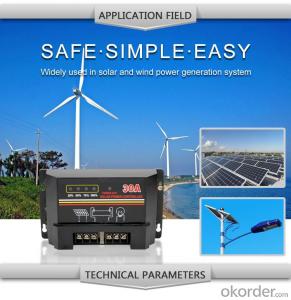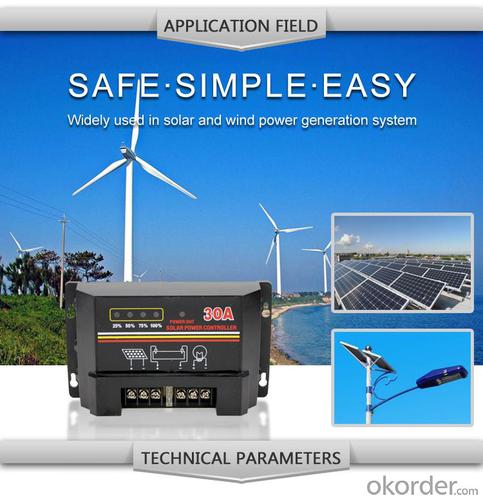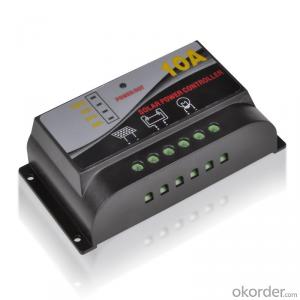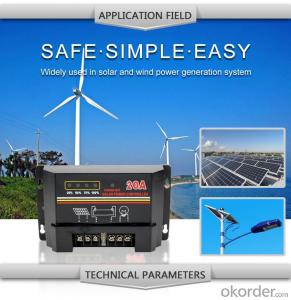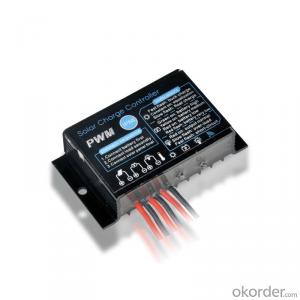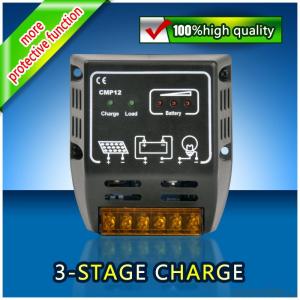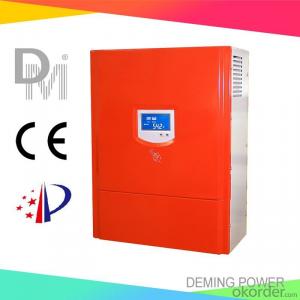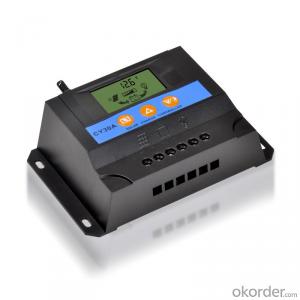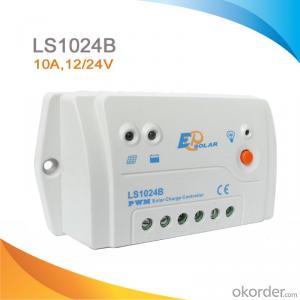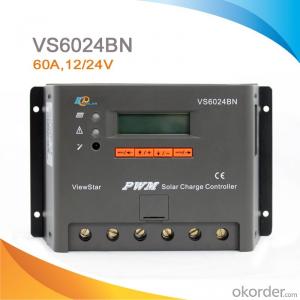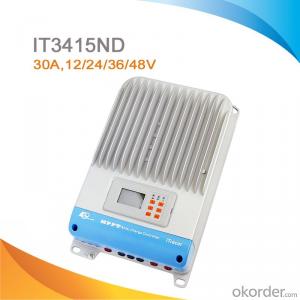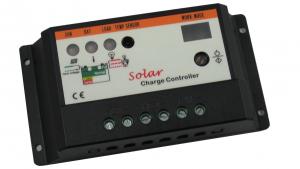100 Watt Solar Panel Controllers - Solar LCD Controller DM130A with Best Price Hot Selling Model
- Loading Port:
- China main port
- Payment Terms:
- TT or LC
- Min Order Qty:
- 1 unit
- Supply Capability:
- 10000 unit/month
OKorder Service Pledge
OKorder Financial Service
You Might Also Like
Product IntroductionSolar controller is control device which can control solar panel and transform solar energy into electricity then store to the battery bank. Solar controller is the most important part in offgrid system, whose performance has much effect on life expectancy and operation of the whole system, especially the battery expectancy.
Application Areas
Standalone Photovoltaic power station
Standalone Domestic household photovoltaic power system
Mobil communication base stations, expressway and other non-residential regions.
Coastal islands, remote mountainous, border posts for regions shortage of or without electricity.
Government demonstration projects, landscape lighting project etc.
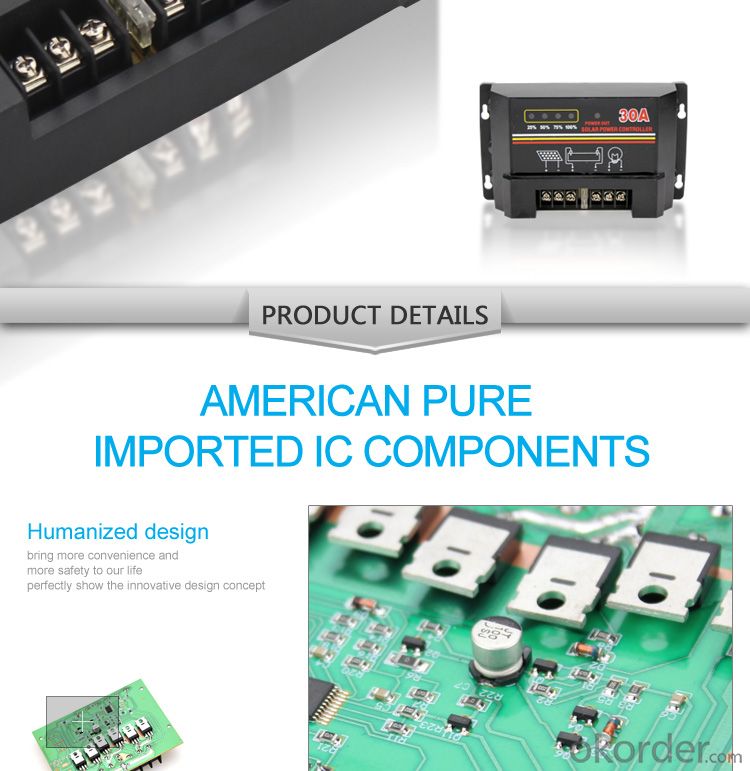
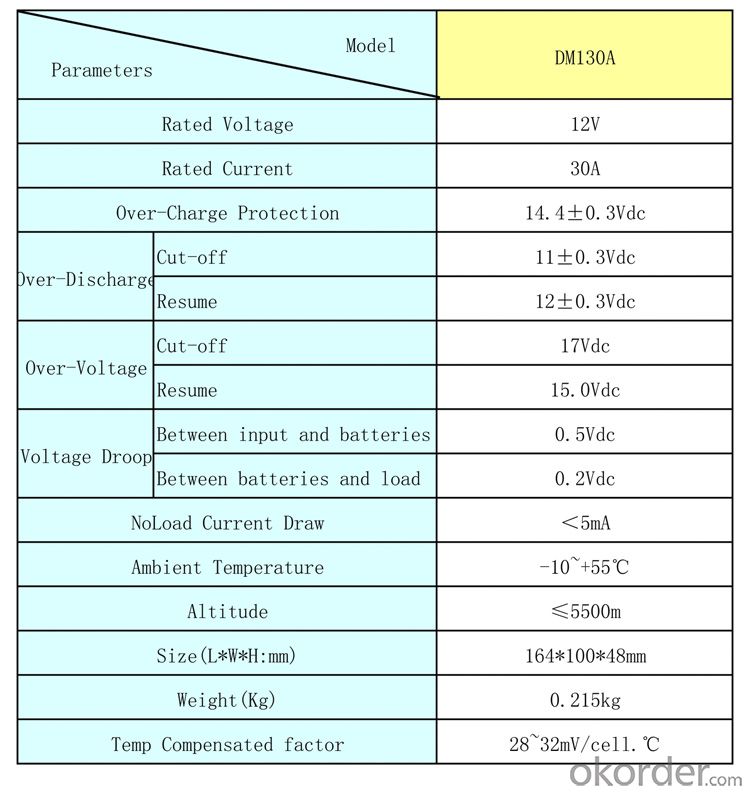
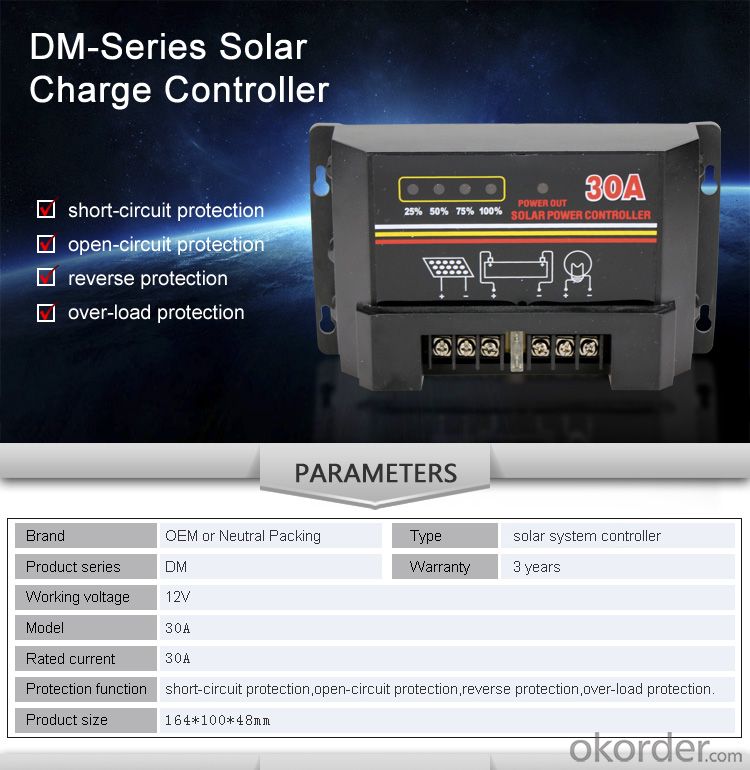
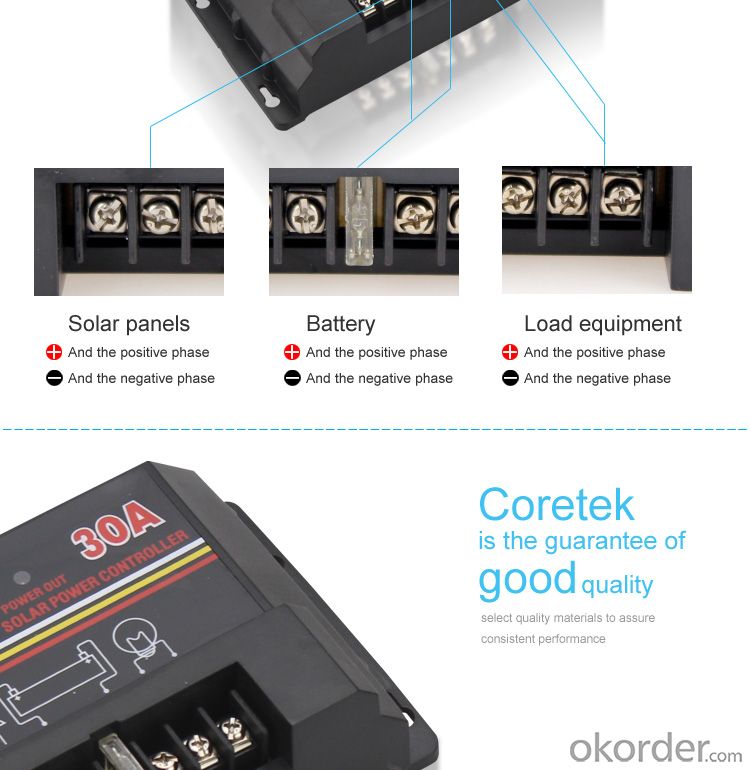
- Q: How does a solar controller prevent damage to the solar panels from hail or storm events?
- A solar controller does not directly prevent damage to solar panels from hail or storm events. However, it plays a crucial role in the overall system by regulating and optimizing the flow of electricity from the panels to the battery or grid. This helps protect the panels indirectly by ensuring that the excess power generated during storms or hail events is safely diverted or stored, reducing the risk of any electrical overload or damage. Additionally, some advanced solar controllers may have built-in surge protection features that can provide an added layer of defense against sudden power surges caused by severe weather conditions.
- Q: Can a solar controller be used in a remote location where grid power is not available?
- Yes, a solar controller can be used in a remote location where grid power is not available. Solar controllers are designed to regulate the charging process of batteries using solar panels. They can operate independently from the grid, making them suitable for off-grid locations or areas without access to electricity.
- Q: Can a solar controller be used with solar-powered electric fences for livestock?
- Indeed, a solar controller is compatible with solar-powered electric fences designed for livestock. Serving as a vital element within a solar-powered electric fence setup, the solar controller effectively manages the power distribution from the solar panel to the fence energizer. Its primary function is to guarantee efficient charging of the battery and the seamless operation of the fence. Additionally, the solar controller plays a crucial role in safeguarding the battery against overcharging, thus extending its lifespan. Consequently, utilizing a solar controller alongside a solar-powered electric fence for livestock is strongly advised to ensure the system's utmost performance and sustainability.
- Q: Can a solar controller be used in a solar-powered heating system?
- Yes, a solar controller can be used in a solar-powered heating system. A solar controller is responsible for regulating the flow of electricity from the solar panels to the heating system, ensuring efficient operation and preventing overcharging of the batteries. It helps optimize the performance of the heating system by monitoring and adjusting the energy input based on the heating requirements.
- Q: Are there any safety features built into solar controllers?
- Yes, there are several safety features built into solar controllers. One of the most important safety features is overcharge protection. Solar controllers are designed to prevent the batteries from being overcharged, which can lead to damage or even explosions. The controller monitors the battery voltage and adjusts the charging current to ensure that the battery is charged optimally without overcharging. Another safety feature is reverse polarity protection. This feature ensures that the solar controller will not be damaged if the battery or solar panel connections are accidentally reversed. It helps prevent any potential short-circuits or damage to the controller. Many solar controllers also have over-discharge protection. This feature prevents the battery from being discharged too much, which can reduce its lifespan or even cause irreversible damage. The controller monitors the battery voltage and automatically disconnects the load when the battery voltage drops below a certain threshold. Additionally, some solar controllers have temperature compensation. This feature adjusts the charging voltage based on the temperature of the battery. It ensures that the battery is charged properly regardless of the ambient temperature, which helps to extend the battery's life. Overall, solar controllers are equipped with various safety features to protect both the batteries and the controller itself. These features help to ensure the safe and efficient operation of solar power systems.
- Q: How do I know if my solar controller is working properly?
- To determine if your solar controller is functioning correctly, you can perform a few simple checks. Firstly, ensure that the controller's LED indicators are lit and displaying the appropriate status or error codes. Additionally, monitor the battery voltage and ensure the controller is charging it to the recommended levels. You can also examine the controller's connection terminals and wiring for any signs of damage or loose connections. Lastly, consult the controller's user manual for specific troubleshooting steps or contact the manufacturer for further assistance if needed.
- Q: Can a solar controller handle high temperatures?
- Yes, a solar controller can handle high temperatures. Solar controllers are designed to operate efficiently even in extreme heat conditions, ensuring the proper functioning and protection of the connected solar panels and batteries. They are equipped with thermal management systems and components that can withstand high temperatures without compromising their performance or longevity.
- Q: What is the maximum load current of a solar controller?
- The maximum load current of a solar controller depends on the specific model and its specifications. It can vary widely, ranging from a few amps to several hundred amps, depending on the size and capacity of the solar controller.
- Q: How do you install a solar controller?
- To install a solar controller, start by determining the appropriate location near the solar panels where it will receive sufficient sunlight. Next, connect the solar panel's positive and negative leads to the controller's corresponding terminals. Then, connect the controller's battery terminals to the battery bank, ensuring correct polarity. Finally, connect any load or device to the controller's load terminals. Make sure to follow the manufacturer's instructions and safety guidelines throughout the installation process.
- Q: What is the maximum voltage drop allowed between the solar panels and the solar controller?
- The solar panels' and solar controller's specific system and components determine the maximum voltage drop allowed. To ensure efficient operation, it is typically advised to maintain a voltage drop below 2%. Nevertheless, this threshold can fluctuate based on factors like the distance separating the panels and controller, system size, and wiring type employed. Consulting the manufacturer's specifications and guidelines for the solar panels and controller in use is crucial for identifying the highest acceptable voltage drop.
Send your message to us
100 Watt Solar Panel Controllers - Solar LCD Controller DM130A with Best Price Hot Selling Model
- Loading Port:
- China main port
- Payment Terms:
- TT or LC
- Min Order Qty:
- 1 unit
- Supply Capability:
- 10000 unit/month
OKorder Service Pledge
OKorder Financial Service
Similar products
Hot products
Hot Searches
Related keywords
